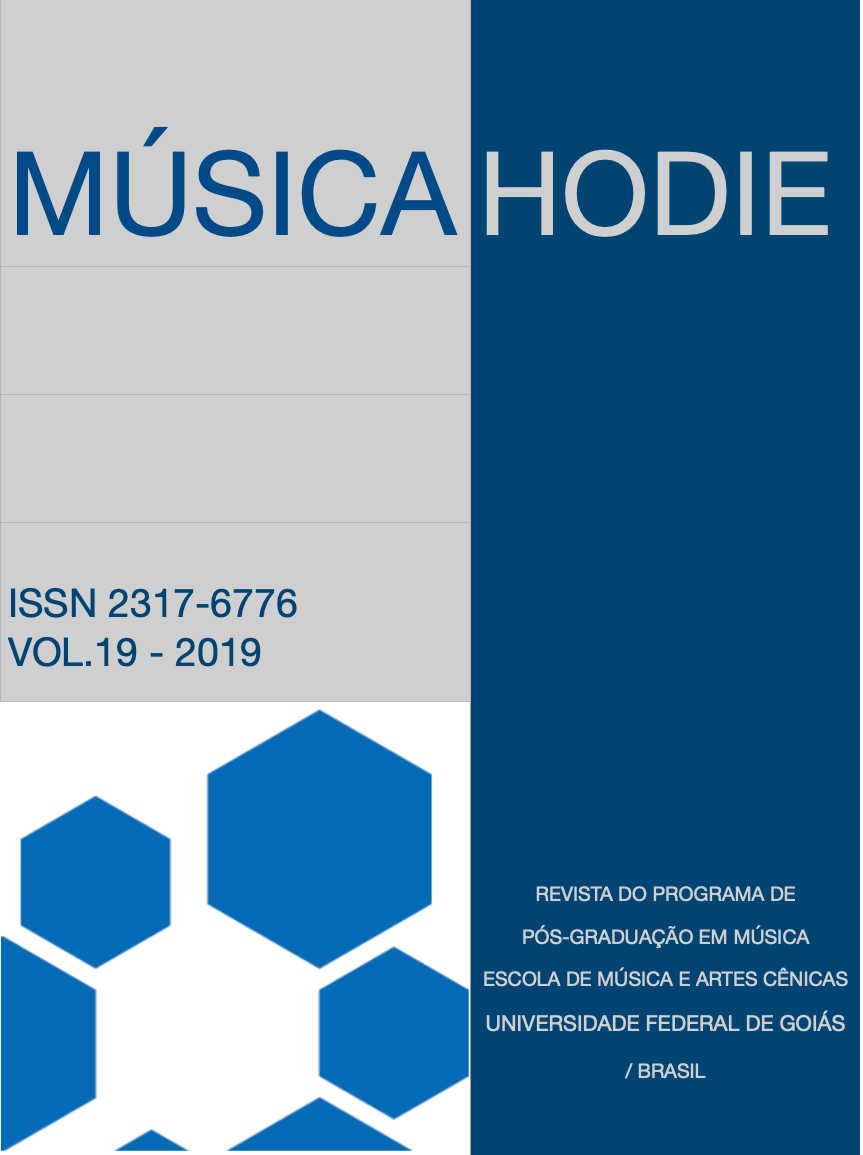Transcoding the I Ching as Composition Techniques in Chou Wen Chung, Zhao Xiaosheng and Chung Yiu Kwong
DOI:
https://doi.org/10.5216/mh.v19.52739Palabras clave:
I Ching, Compositional System, Chou Wen Chung, Zhao Xiao Sheng, Chung Yiu KwongResumen
This article examined into three Chinese composers’ compositional method based on the ancient Chinese philosophy I Ching. Transcoding the 64 hexagrams of the I Ching in the piano solo works of Chou Wen Chung, Zhao Xiao Sheng and Chung Yiu Kwong display new representative of Chinese New Music. The analysis shows Chou and Chung’s creations that emphasize the use of the 64 hexagrams within a Westernized context, while Zhao brought out a new and individual compositional method based on the Chinese ancient philosophy that shows a complete departure from the West.
Descargas
Citas
ADLER, Jnseph A. Reconstructing the Confucian Dao: Zhu Xi's Appropriation of Zhou Dunyi. 2.ed. New York: The State University of New York Press, 2014. 342p.
AU, Rebecca Sau-woon. I Ching in the Music of John Cage, Chou Wen Chung and Zhao Xiao Sheng. Doctoral dissertation. The Chinese University of Hong Kong, 2013. Ann Arbor: ProQuest ILC, 2014. 223p.
BIAN, Meng; BIAN Shanyi (Trans.). Zhongguo Gangqin Wenhua zhi Xingcheng yu Fazhan [????????????, The Formation and Development of China's Piano Culture]. Beijing: China Music Press, 1996. 181p.
BRUNER, Edward M. Experience and Its Expressions. In TURNER, Victor W. & BRUNER, Edward M. The Anthropology of Experience. Urbana: University of Illinois Press, 1986. p. 3-32.
CHANG, Chung Yuan. Creativity and Taoism: A Study of Chinese Philosophy, Art and Poetry. London: Singing Dragon, 2011. 239 p.
CHANG, Peter M. Chou Wen-Chung's Cross-Cultural Experience and His Musical Synthesis: The Concept of Syncretism Revisited. Asian Music, Texas, v. 32, n. 2, p. 93-118, 2001.
CHANG, Peter M. Chou Wen Chung and his Music: A Musical and Biogrophical Profile of Cultural Synthesis. Doctoral dissertation. University of Illinois at Urbana-Champaign, 1995. Ann Arbor: A Bell & Howell Information Company, 1995. 321p.
CHANG, Peter M. Chou Wen-Chung: The Life and Work of a Contemporary Chinese-Born American Composer. Lanham, MD: Scarecrow Press, 2006. 264p.
CHEN, Chia Chi. Chou Wen-Chung: His Life, the Inspiration of His Musical Language, and an Analytical Study of Windswept Peaks from the Perspective of Chinese Aesthetics. Doctoral dissertation. Cornell University, 2006. Ann Arbor: ProQuest ILC, 2006. 116p.
CHEN, Charles H. I Ching (Yi Jing) and Modern Science: Its Application for the Benefit of Human Society. Bloomington: iUniverse, 2017. 54p.
CHEN, Hui Ju. East Meets West: The Effect of the Compositional Style of Western Vocal Music on Contemporary Taiwanese Composers. Doctoral dissertation. The University of Maryland, 2008. College Park, MD: The University of Maryland, 2008. 14p.
CHEN, Mingzhi. Bagua shi Zenyang Kongzhi Yinyue de: Zhao Xiaosheng Gangqin Duzou Zuopin Taiji [??????????——?????????, How to Control Music by Eight Trigrams: Zhao Xiaosheng's Piano Solo Work Tai Chi ]. Music Lover, Shanghai, n.01, p. 4-5, 1988.
CHOU, Wen Chung. A Brief Explanation of Variable Modes, in Chou Wen-chung’s own words. Retrieved from http://www.chouwenchung.org/music/chou_on_variable_modes.php Accessed on 4 May, 2017.
CHUNG, Yiu Kwang. I Ching Compositional System: The Symbolism, Structures, and Orderly Sequence of the Sixty-four Hexagrams as Compositional Determinanits. Doctoral dissertation. The City University of New York, 1995. Ann Arbor: A Bell & Howell Information Company, 1995. 116p.
CHUNG, Yiu Kwong. Online interview on 27 July, 2017.
GAO, Heng. Zhouyi Dazhuan Jinzhu [??????, The Updated Commentories of I Ching]. Jinan: Shandong Qilu Press, 2009. 596p.
GUO, Shunchun. Gudai Shijie Shuxue Taidou Liu Hui [??????????, Liu Hui, The Leading Authority of Mathematics in Ancient World ]. Jinan: Shandong Science and Technology Press, 2013. 452p.
JENSEN, Marc G. John Cage, Chance Operations, and the Chaos Game: Cage and the "I Ching". The Musical Times, East Sussex, v. 150, n. 1907, p. 97-102, 2009.
JIN, Jingfang; LV Shaogang. Zhouyi Jiangzuo [????,The Speech of I Ching]. Changchun: Jilin Unversity Press, 1937. 407p.
KIM, Joo Won. The Development of Contemporary Korean Music with Emphasis on Works of Isang Yun. Doctoral dissertation. The Ohio State University, 2011. Columbus, OH: The Ohio State University, 2011. 87 p.
KOUWENHOWEN, Frank. Mainland China's New Music (3)—The Age of Pluralism. Chime Journal, Leiden, n. 5, p. 76-132, 1992.
KWAN, Chung Ming. Chou Wen-chung’s modal system: the Basics. In CHOU WEN-CHUNG MUSIC FESTIVAL: SPECIAL ALBUM: SERIES OF LECTURE, SEMINARS AND COMPOSITION WORKSHOPS "ASIAN MUSIC- WHAT IS THE FUTURE?", Taipei, 2003. Available at <http://www.chouwenchung.org/music/modal_system_basics_p4.php. Accessed on 4 May, 2017.
LACH, Donald F. Leibniz and China. Journal of the History of Ideas, Philladelphia, v. 6, n. 4, p. 436-455, 1945.
LAI, Eric C. Modal Formations and Transformations in the First Movement of Chou Wen-Chung's"Metaphors". Perspective of New Music, Seattle, WA, v. 35, n. 1, p. 153-185, 1997.
LAI, Eric C. The Music of Chou Wen-chung. Farnham, Surrey, UK: Ashgate, 2009. 176p.
LANG, Xi. Kaichuang de Yidai Zhuanzhe de Yidai Maodun de Yidai - Qingnian Zuoqujia de Chuangzuo, Kuzhong yu Maodun [????? ????? ?????——??????????????, The generation of Innovation, Retroflexion and Contradiction-the Composition, Hardship and Conflict of Youth Composers]. People's Music, Beijing, n. 6, p.6-8, 1986.
LAU, Frederic. When a Great Nation Emerges: Chinese Music in the World. In YANG Hon Lun & SAFFLE Michael. China and the West: Music, Representation, and Reception. Ann Arbor, US: University of Michigan Press, 2017. p. 265-310.
LEGGE James (Trans.). The Secred Books of China: The I Ching. New York: Dover Publication, Inc, 1963. 448p.
LI, Dingzuo. Zhouyi Jijie [????, The Assembly Commentaries of I Ching]. Beijing: Central Compilation & Tanslation Press, 2011. 651p.
LI, Xiaole. Chen Yi's Piano Music: Chinese Aesthetics and Western Models. Doctoral dissertation. The University of Hawai, 2003. Hawai: The University of Hawai Liberary, 2003. 380p.
LIN, Ginny S. The Tao of Lao Tzu and Yin-Yang in the I Ching's Ten Wings with Special Reference to Contemporary Crises. Doctoral dissertation. California Institute of Integral Studies, 2008. Ann Arbor: ProQuest ILC, 2009. 313p.
LIU, Ching Chih. Lun Zhongguo Xinyinyue [??????, The Discussion of Chinese new Music]. Shanghai: Shanghai Conservotary of Music Press, 2009. 347p.
LIU, Ching Chih; MASON, Caroline (Trans.). A Critical History of New Music in China. Hong Kong: The Chinese University Press, 2010. 1000p.
LOO, Fung Ying; LOO, Fung Chiat. Chinese Science in Piano Pedagogy: Evaluating the Chronicles of Piano Playing Technique with Taichi. Procedia-Social and Behavioral Sciences, Radaweg, Amsterdam, n. 46, p.3102-3106, 2012.
LOO, Fung Ying; LOO, Fung Chiat. Tai chi Qi flow in the kinematic process of piano playing: An application of Chinese science. World Applied Sciences Journal, Deira, Dubai, v. 21, n. 1, p.98-104, 2013.
LU, Bai; PANG, Petti T; WOO, Newton H. The Yin and Yang of Neurotrophin Action. Nature Reviews Neuroscience, London, v. 6, n. 8, p. 603-614, 2005.
MA, Qianyue. Jiexi Zhao Xiaosheng Taiji Zuoquxitong dui Yingaocailiao de Kongzhi [???????????????????, An Analysis of Pitch Materials controlled by Zhao Xiaosheng's Tai Chi composition system]. Master thesis. Xi'an Conservatory of Music, 2013. Xi'an: Xi'an Conservatory of Music, 2013. 69p.
RAO, Nancy Yunwha. Hearing Pentatinicism Through Serialism: Integrating Different Traditions in Chinese Contemporary Music. Pespective of New Music, Seattle, WA, v. 40, n. 2, p. 190-231, 2002.
RYAN, James A. Leibniz' Binary System and Shao Yong's "Yijing". Philosophy East and West, Hawai, v. 46, n. 1, p.59-90, 1996.
SHI, Yang. Zhao Xiao Sheng Taiji Zuoquxitong Xiandai Siwei Tansuo [???????????????, A Modernity Thinking Exploration on Zhao Xiaosheng's Tai Chi Composition System]. Master thesis. Central China Normal University, 2012. Wuha: Central China Normal University, 2012. 42p.
TEMPERLEY, David. Composition, Perception, and Schenkerian Theory. Music Theory Spectrum, New York, v. 33, n. 2, p.146-168, 2011.
TSAI, Yi Chuan. Taiwanese Traditional Musical Idioms Meet Western Music Composition: An Analytical and Pedagogical Approach to Solo Piano Works by Tyzen Hsiao. Doctoral dissertation. The University of Southern Mississippi, 2017. Hattiesburg: The Aquila Digital Community, 2017. 74p.
WANG, Anguo. "Xinchao" Yinyue - Yiduan Teding de Lishi Wenhua Guocheng ["??"??——???????????, "New Wave" Music - A Special historal and cultural process]. Literature & Art Studies, Beijing, n. 1, p. 62-72, 1988.
WANG, Zhenya. Zhongguo Zuoqujifa de Yanbian [?????????, The Evolution of Chinese Compositional Techniques]. Beijing: Central Conservotary of Music Press, 2004. 290p.
WANG, Zidong. A Study on the Constructive Modes of Pitch System of Chou Wen Chung's Music. Doctoral dissertation. Shanghai Conservatory of Music, 2013. Shanghai: Shanghai Conservatory of Music, 2013. 148p.
WU, Zong Jie; HAN, Chun Yan. Pedagogy Toward Diversity: A Cross-Cultural Approach to Historicizing the Present. In PEREYRA, Miguel A. & FRANKLIN, Barry M. (Ed.). Systems of Reason and the Politics of Schooling: School Reform and Science of Education in the Tradition of Thomas S. Popkewitz. New York: Routledge, 2014. p. 180-206.
XU, Weiyu; LIANG Yunhua (Ed.) Lvshi Chunqiu Jishi [??????, The Commentories of Lv's Spring and Autumn Annals]. Beijing: Zhonghua Book Company, 2016. 642p.
ZENG, Shi Qiang. Yijing de Aomi [?????, The Mystery of I Ching]. Xi'an: Shanxi Normal University Press, 2009. 236p.
ZHAO, Jingxuan. Per Nørgård Yijing zhi Zuopin Fenxi yu Yishu Fengge de Duoyuanxing Tantao [??.?????????????????????, The Analysis of Per Nørgård's Yijing and its multi-feature]. Master thesis. Central Conservotary of Music, 2014. Beijing: Central Conservotary of Music, 2014. 18p.
ZHAO, Wenbin. Lun Wuxing zhong Zhuti de Goucheng jiqi Fazhan Shoufa [???????????????, On the Construction of Themes and Development of "Five Elements"]. Journal of Tianjin Conservotary of Music (Sounds of Nature), Tianjin, n. 2, p. 50-58, 2010.
ZHAO, Xiaosheng. Taiji Zuoqu Xitong: Zhao Xiaosheng Yinyue Lunji [??????????????, Tai Chi Composition System: the Analects of Zhao Xiaosheng's Music]. Guangzhou: Guangzhou Branch, Popular Science Press, 1990. 394p.
ZHAO, Xiaosheng. Tai Chi Composition System( new edition). Shanghai: Shanghai Music Press, 2006. 323p.
ZHAO, Xiao Sheng. Interview on 31 October, 2016. Shanghai, China.
ZHOU, Jinmin. New Wave Music in China. Doctoral dissertation. University of Maryland Baltimore County, 1993. Ann Arbor: A Bell & Howell Information Company, 1993. 327p.
ZHOU, Qinru. Yinyue Shenceng Jiegou de Jianhua Huanyuan Fenxi [?????????????——???????,The Simplicity and Reduction Analysis of Musical Profound Structure-Commentary to Schenkerian Analysis]. Music Research, Beijing, n. 2, p. 25-36 & 81, 1987.
ZHOU, Weimin. 20 Shiji Zhongguo Yinyue Chuangzuo de Huigu yu Sikao [20????????????????, The Rethinking about Chinese piano compositions in 20th century]. Chinese Music, Beijing, n. 2, p. 116-121, 2007.
ZHU, Jianer. He'erbutong ------Wuchongzou "He" Chuangzuo Zhaji [????——??????????, Combinition with Difference-Compositional Notes of He for Quintet]. Music Arts - Journal of Shanghai Conservotary of Music, Shanghai, n. 1), p. 52-55, 1995.















